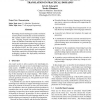Free Online Productivity Tools
i2Speak
i2Symbol
i2OCR
iTex2Img
iWeb2Print
iWeb2Shot
i2Type
iPdf2Split
iPdf2Merge
i2Bopomofo
i2Arabic
i2Style
i2Image
i2PDF
iLatex2Rtf
Sci2ools
COLING
1992
1992
The Kant System: Fast, Accurate, High-Quality Translation In Practical Domains
Knowledge-based interlingual machine translation systems produce semantically accurate translations, but typically require massive knowledge acquisition. Ongoing research and development at the Center for Machine Translation has focussed on reducing this requirement to produce large-scale practical applications of knowledge-based MT. This paper describes KANT, the first system to combine principled source language design, semi-automated knowledge acquisition, and knowledge compilation techniques to produce fast, high-quality translation to multiple languages. 1 Overview Any expert system is only as good as the knowledge programmed into it; the same is true of a knowledge-based translation system. A KBMT system can only produce accurate, high-quality translations if it can unambiguously determine the meaning of the input text and choose an appropriate phrasing of that meaning in the target language. This implies a significant domain knowledge base in addition to the usual syntactic gra...
COLING 1992 | COLING 2008 | Knowledge Acquisition | Knowledge-based Translation | Machine Translation |
| Added | 07 Nov 2010 |
| Updated | 07 Nov 2010 |
| Type | Conference |
| Year | 1992 |
| Where | COLING |
| Authors | Eric Nyberg, Teruko Mitamura |
Comments (0)

